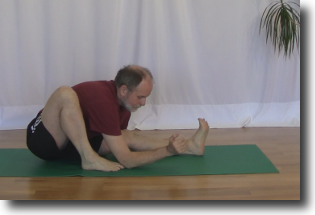I have an interesting story to tell you about workshops and learning.
Many years ago I went to a yoga workshop. It was in fact one of the first workshops that I went to. I took an air plane ride to get there and I spent the weekend learning a lot about Ashtanga Yoga, both the philosophy and the asanas.
When I got home I was excited about all of the new things that I had learnt and shared some of the techniques with my teacher.
Grounded Elbow Technique
One particular technique I shared with her was a technique that helped you get further into Marichyasana A. In the grounded elbow technique you lean forward and attempt to get your elbow on the floor in front of your big toe before you attempt to wrap your arms around your back and bind your hands together.
My teacher liked the grounded elbow technique and thought that it would be a good teaching tool. I never did notice her using the technique to teach people how to do Marichyasana A after that.
Several years later
My teacher came back from a yoga workshop and shared with me this great technique that she had learnt that would help people to get deeper into Marichyasana A. She then showed me the grounded elbow technique. This was the same thing that I had shown her years before but it was all new to her.
She did not remember me telling her about this technique years earlier. Having a quick conversation before class is not the best learning environment. Going to a workshop does help you to remember more.
Why do you remember more when you go to a workshop?
There are many benefits that you get from going to a workshop. You get to travel to a different place, meet new people, renew old friendships and you get to learn lots as well.
There are three reasons why you learn more at a workshop:
- It is a learning environment
- you practice
- you get feedback
It is a learning environment
When you go to a workshop you are expecting to learn. Because you are expecting to learn, your mind is primed and is more receptive. You are looking for the new information. You make notes about what you have learnt. You are focused on everything that the workshop leader is saying and you are doing your best to remember it.
This is a very different environment compared to the few minutes before class that I shared the “Grounded Elbow Technique” with my teacher. There are a lot less distractions in a workshop and as a result you are able to stay focused and learn more.
You practice
You have lots of opportunity to practice what you are learning which will help to make the knowledge sticky. You are less likely to forget it if you have a chance to practice it on others.
Experiencing the technique being practised on you will also help to cement the knowledge firmly in your mind.
You get feedback
Additionally you can ask questions about the technique to the workshop leader, their assistances and the other workshop participants that you are partnered with.
Getting feedback and clarifications will once again help to make the knowledge stick.
Summary
The next time you come back from a workshop full of enthusiasm about all of the stuff that you have learnt, don’t be disappointed if your practice buddies and your teachers do not remember everything that you tell them about from the workshop.
Remember that a workshop is learning environment that helps you to remember what they are teaching you and that your practice buddies will have to go a workshop too if they want to learn as much as you did.
Next Steps
The next time a workshop is being offered in your area, grab a couple of your practice buddies and take them along and then you will all be able to share in the learning experience and come back to class with lots of new knowledge and techniques to share with them.




